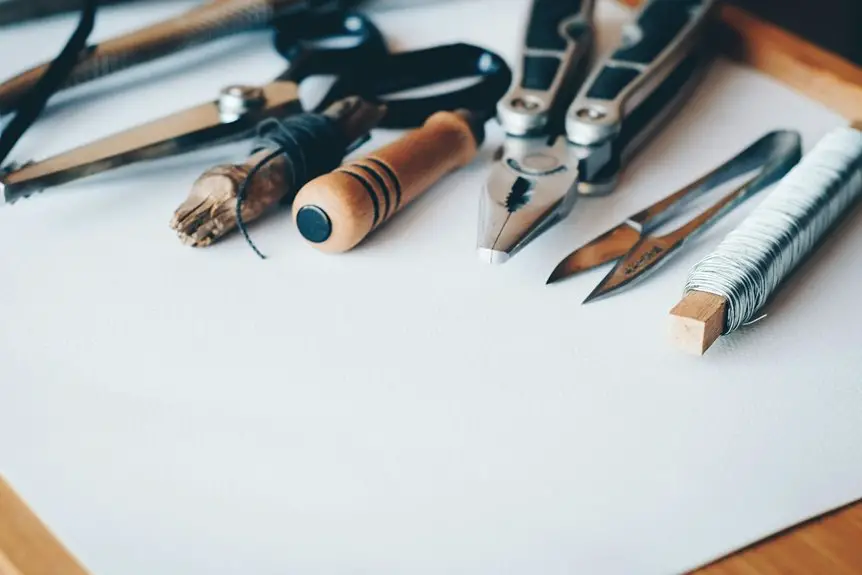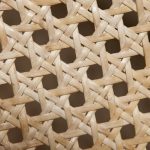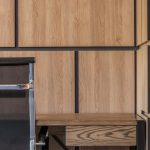When you're choosing a desk for long-term use, durability is key. You need a surface that can withstand the daily grind while maintaining its appeal. Different materials offer unique strengths, from the timeless charm of solid wood to the modern resilience of metal. Each option has its perks and drawbacks, and the right choice depends on your specific needs. Let's explore these materials and discover which one might be the best fit for your workspace.
Table of Contents
Key Takeaways
- Solid wood is incredibly durable, aging gracefully and developing unique character while resisting warping and dents over time.
- Metal offers exceptional durability, resisting scratches and dents, making it ideal for high-traffic work environments.
- Laminates provide a cost-effective, durable option, with high-pressure varieties suitable for heavy use and easy maintenance.
- Glass, specifically high-quality tempered glass, is strong, scratch-resistant, and requires minimal upkeep, enhancing any workspace's modern aesthetic.
- Bamboo is an eco-friendly, sustainable material known for its strength, durability, and natural resistance to moisture and pests.
Solid Wood
When you think of durability, solid wood often comes to mind as a top choice for desk materials. Its natural strength and resilience make it an ideal option for long-term use.
Unlike cheaper alternatives, solid wood can withstand wear and tear, retaining its beauty over time. You'll appreciate how it ages gracefully, developing a unique character as it develops a patina.
Plus, solid wood is less likely to warp or dent compared to particleboard or laminate. With proper care, like regular polishing and humidity control, your solid wood desk can last for decades.
Investing in a solid wood desk isn't just a purchase; it's a commitment to quality and longevity that enhances your workspace aesthetically and functionally.
Metal
Metal desks offer a modern and industrial aesthetic that combines strength with style. They're incredibly durable, resisting scratches, dents, and warping over time. If you're looking for a desk that can handle heavy use, metal's your best bet. You won't have to worry about everyday wear and tear, making it perfect for busy work environments.
Additionally, metal desks often come in various finishes, allowing you to match them with your decor. Whether you prefer a sleek, polished look or a rugged, distressed finish, there's a metal desk for you.
Plus, their stability ensures you won't experience wobbling, even during intense work sessions. With a metal desk, you'll enjoy both functionality and aesthetic appeal for years to come.
Laminates
When choosing laminates for your desk, you'll find various types that offer unique benefits.
These materials are known for their durability and resistance to wear, making them a practical choice.
Plus, knowing how to maintain and care for them will ensure they last for years to come.
Types of Laminates
Although laminates come in various types, each with unique properties, they all serve a common purpose: enhancing the durability and aesthetics of surfaces.
One popular type is high-pressure laminate (HPL), which is great for heavy use due to its toughness. If you're looking for a budget-friendly option, consider low-pressure laminate (LPL); it's less durable but still offers a decent finish.
Then there's decorative laminate, which focuses more on visual appeal, allowing you to customize your workspace.
Finally, you can't overlook moisture-resistant laminates, perfect for areas prone to spills.
Durability and Resistance
While selecting laminates for your desk, it's crucial to consider their durability and resistance to various elements. Quality laminates can withstand daily wear and tear, ensuring your workspace remains functional and attractive.
Here are four key factors to look for:
- Scratch Resistance: Choose laminates that can resist scratches from everyday use, maintaining a smooth surface.
- Water Resistance: Opt for laminates that repel moisture to prevent warping or damage from spills.
- Heat Resistance: Ensure your laminate can withstand hot items without warping or discoloration.
- Chemical Resistance: Look for laminates that resist stains from common office supplies, keeping your desk looking new longer.
Maintenance and Care
Maintaining your desk's laminate surface is key to preserving its durability and appearance. Start by regularly wiping it down with a soft, damp cloth to remove dust and spills. Avoid abrasive cleaners or scrubbers, as they can scratch the surface.
For tougher stains, use a mild soap solution, then rinse with a clean, damp cloth. If you accidentally damage the laminate, you can often use a matching repair kit to fix small chips or scratches.
Keep heavy objects off the edges to prevent warping and always use coasters to protect against heat and moisture. Lastly, avoid placing your desk in direct sunlight to prevent fading.
With these simple steps, your laminate desk will remain attractive and functional for years to come.
Glass
Have you ever considered glass as a desk material? It's not just stylish; it's also durable and can elevate your workspace.
Here are some reasons why glass might be the perfect choice for you:
- Sleek Appearance: Glass desks offer a modern, minimalist look that can enhance any office decor.
- Easy to Clean: A quick wipe with a cloth keeps your desk looking pristine; no complicated maintenance required.
- Stability: High-quality tempered glass is incredibly strong and resistant to scratches, ensuring longevity.
- Versatile Design: Glass can fit seamlessly in various environments, whether it's home, corporate, or creative spaces.
If you're looking for a desk that combines elegance with durability, glass might just be your best option.
Bamboo
When you consider desk materials, bamboo stands out for its sustainability and eco-friendliness.
Not only is it a renewable resource, but it also offers impressive strength and durability.
Choosing bamboo for your desk means you're making a smart, environmentally conscious decision without sacrificing quality.
Sustainability and Eco-Friendliness
As you explore sustainable desk materials, bamboo stands out due to its rapid growth and minimal environmental impact.
This versatile plant not only looks great but also offers several eco-friendly benefits:
- Renewable Resource: Bamboo can grow up to three feet a day, making it one of the fastest-growing plants on Earth.
- Carbon Sequestration: It absorbs more carbon dioxide compared to traditional hardwoods, helping to combat climate change.
- Low Pesticide Use: Bamboo is naturally pest-resistant, requiring fewer pesticides and chemicals during cultivation.
- Biodegradable: At the end of its life cycle, bamboo decomposes naturally, reducing landfill waste.
Strength and Durability
Although many might think of softwoods when considering desk materials, bamboo offers exceptional strength and durability that rivals traditional hardwoods.
Its unique structure, with long fibers running through it, gives bamboo an impressive strength-to-weight ratio. You'll find that bamboo can withstand heavy use without warping or cracking, making it an ideal choice for a desk that'll endure years of daily wear.
Plus, bamboo's natural resistance to moisture and pests adds to its longevity, ensuring your desk remains in great condition.
When you choose bamboo, you're investing in a stylish, resilient surface that's not only functional but also environmentally friendly.
Its versatility allows it to blend seamlessly with any decor, enhancing your workspace while standing the test of time.
High-Density Fiberboard (HDF)
High-Density Fiberboard (HDF) stands out as a versatile and durable material for desk construction, making it a popular choice among manufacturers and consumers alike.
Its impressive properties can enhance your workspace significantly. Here are some key benefits of HDF:
- Cost-Effective: HDF offers a budget-friendly option without sacrificing quality.
- Smooth Surface: You'll enjoy a sleek, even finish that's perfect for writing or using a mouse.
- Resistant to Warping: Unlike solid wood, HDF maintains its shape under varying humidity levels.
- Eco-Friendly: Made from recycled wood fibers, HDF contributes to sustainable practices.
Plywood
When you're looking for a strong and reliable material for your desk, plywood often emerges as a top contender. This engineered wood product combines thin layers of wood veneer, creating a sturdy yet lightweight option.
Its unique construction offers excellent resistance to warping, making it ideal for long-term use. You'll appreciate that plywood can handle heavy loads without sagging, ensuring your workspace remains functional and attractive over time.
Plywood's versatility allows you to customize it with finishes that match your style, from sleek modern looks to rustic charm.
Plus, it's relatively easy to work with, allowing for DIY projects if you're feeling creative. Overall, plywood provides durability and aesthetic appeal, making it a smart choice for your desk.
Frequently Asked Questions
How Do I Maintain My Durable Desk Material?
To maintain your durable desk material, regularly clean it with a soft cloth and mild cleaner. Avoid harsh chemicals, keep it dry, and use coasters to prevent scratches. Regular checks for wear will help too.
Are There Eco-Friendly Options for Desk Materials?
Yes, there're eco-friendly options for desk materials. Bamboo, reclaimed wood, and recycled metal are great choices. They're sustainable, stylish, and contribute to a healthier environment while providing durability for your workspace. You'll love their unique appeal!
What Are the Weight Limits for Each Material?
When considering weight limits, you'll find solid wood typically supports heavier loads, while particleboard and MDF have lower limits. Always check manufacturer specifications to ensure your desk can handle your intended items safely.
Can I Customize the Finish of My Desk?
Yes, you can definitely customize the finish of your desk! Many manufacturers offer a variety of stains, paints, and coatings. Just choose the one that fits your style and matches your space perfectly.
What Is the Best Material for Heavy Equipment?
When it comes to heavy equipment, you'll want to choose materials like steel or reinforced aluminum. They're strong, durable, and can withstand significant stress, ensuring your equipment remains reliable and functional for years.




